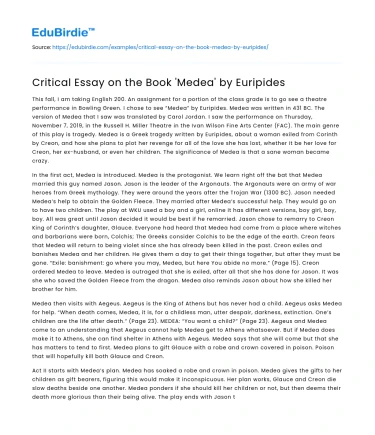Introduction
Euripides' play "Medea" stands as a monumental piece of classical Greek literature, renowned for its intricate exploration of themes such as betrayal, revenge, and the struggle of the individual against societal norms. Written in 431 BC, the play presents Medea, a powerful yet vengeful woman who defies the conventions of her time, challenging the patriarchal structures that sought to suppress her. Through the character of Medea, Euripides crafts a narrative that transcends its historical context, resonating with contemporary audiences as it addresses universal human emotions and conflicts. The play's enduring relevance is reflected in its ability to provoke critical discourse on the nature of justice, the consequences of betrayal, and the limits of human morality. This essay will critically analyze "Medea," focusing on its thematic concerns, characterizations, and its commentary on gender roles, while addressing counter-arguments to provide a comprehensive understanding of its complexities.
Thematic Exploration of Betrayal and Revenge
At the heart of "Medea" lies the powerful theme of betrayal and its subsequent quest for revenge. Medea, once a devoted wife to Jason, is forsaken when he decides to marry Glauce, the daughter of King Creon, to secure his social standing. This betrayal ignites Medea's fury and sets the stage for her calculated vengeance. Euripides delves into the psychological turmoil of his protagonist, portraying Medea's emotional transformation from a loving wife to a vengeful force. Her actions, though extreme, are driven by a profound sense of injustice and a desire to reclaim her agency in a world dominated by men. As Medea herself asserts, "Of all creatures that can feel and think, we women are the worst treated things alive" (Euripides, "Medea"). This quote encapsulates the play's critique of gender inequality, highlighting Medea's struggle against an oppressive society that devalues her worth.
Save your time!
We can take care of your essay
- Proper editing and formatting
- Free revision, title page, and bibliography
- Flexible prices and money-back guarantee
Euripides masterfully balances the moral ambiguity of Medea's revenge, inviting audiences to ponder the ethical implications of her actions. While some may argue that her methods are monstrous, others sympathize with her plight, recognizing the desperation that drives her. This duality is further exemplified in her decision to kill her own children, a horrific act intended to inflict maximum pain on Jason. This extreme measure underscores the depth of Medea's anguish and her willingness to transcend societal norms to assert her autonomy. Critics like Knox (1998) argue that Medea's actions, though reprehensible, reflect a deeper commentary on the human condition and the destructive potential of unchecked emotions.
However, detractors of this interpretation suggest that Medea's actions cannot be justified under any circumstances, viewing them as a cautionary tale about the dangers of allowing vengeance to consume one's humanity. Despite these criticisms, Euripides' portrayal of Medea remains a compelling exploration of the complexities of human emotion and the consequences of betrayal, resonating with audiences across centuries.
Characterization and Gender Dynamics
Euripides' "Medea" offers a profound commentary on the gender dynamics of ancient Greek society through its complex characterization of Medea. As a foreign woman in a patriarchal society, Medea embodies the marginalized "other," challenging the traditional roles assigned to women. Her intelligence, eloquence, and determination defy the passive, submissive archetype expected of women in her time. Euripides crafts a character who is not only aware of her marginalized status but also actively seeks to dismantle the structures that oppress her. Medea's assertion, "I am not of the common sort of women" (Euripides, "Medea"), signifies her refusal to conform to societal expectations and her resolve to assert her identity.
The play's depiction of Medea's defiance against patriarchal authority is further exemplified in her interactions with male characters. Her confrontation with Creon reveals her astute manipulation of social norms, as she feigns submission to secure a temporary reprieve. This strategic maneuvering highlights Medea's ability to navigate and subvert the power structures that seek to confine her. Additionally, her confrontation with Jason exposes the hypocrisy of patriarchal values, as she condemns his betrayal and underscores the double standards that govern gender relations.
Yet, some critics argue that Euripides' portrayal of Medea reinforces negative stereotypes of women as irrational and emotionally volatile. This perspective suggests that Medea's extreme actions serve to caution against the dangers of female empowerment unchecked by societal constraints. Nevertheless, Euripides presents Medea as a multi-dimensional character whose motivations and actions are shaped by the oppressive environment she inhabits. Her journey embodies the struggle for autonomy and the quest for justice in a world that seeks to silence her voice.
Conclusion
Euripides' "Medea" endures as a powerful exploration of betrayal, revenge, and the dynamics of gender and power. Through the character of Medea, Euripides crafts a complex narrative that challenges societal norms and highlights the enduring relevance of these themes. The play's moral ambiguity invites audiences to engage with the ethical implications of Medea's actions, prompting reflection on the nature of justice and the consequences of betrayal. While interpretations may vary, the play's ability to provoke critical discourse underscores its significance in both historical and contemporary contexts.
Ultimately, "Medea" serves as a reminder of the destructive potential of unchecked emotions and the enduring struggle for agency in a world defined by power imbalances. As audiences continue to grapple with the complexities of Medea's character and the themes she embodies, Euripides' work remains a testament to the timeless nature of human conflict and the unyielding pursuit of justice.






 Stuck on your essay?
Stuck on your essay?

